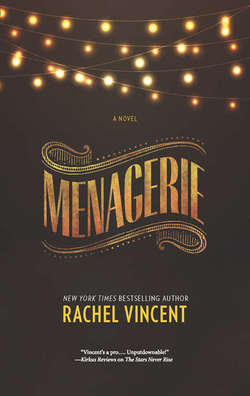Читать книгу Menagerie - Rachel Vincent - Страница 23
ОглавлениеRudolph
“Just twist that button next to the window, and you’ll be able to hear what they’re saying.” The sheriff’s deputy still had one hand on the doorknob, clearly eager to leave the observation room. Rudolph Metzger was neither surprised nor offended. Often locals were almost as unnerved by menagerie workers and their close proximity to the beasts as they were by the beasts themselves. “They can’t see or hear you. The sheriff will be with you shortly,” the deputy added on his way out.
Rudolph exhaled slowly when the door closed behind the officer, leaving him alone in the dim interrogation/observation room with Gallagher.
One hundred and twelve years.
That’s how long the menagerie had been in Rudolph’s family. The Metzgers had been bringing quality live entertainment to small towns all over the U.S. since before cell phones and personal computers. Since before the internet brought footage of dangerous and exotic creatures into private homes with one simple click of a mouse.
Since long before the reaping and the repeal of the Sanctuary Act.
Back then, business was simple and the creature carnival was smaller. Beasts only. The chimera. The phoenix. The basilisk. Nothing with human parts could be caged or put on display, but business was good because outside of zoos and traveling menageries, private citizens couldn’t get an up close look at a griffin without getting their eyes pecked out or their limbs ripped off.
But the technological boom had not been good to traveling circuses.
Rudolph shrugged off bittersweet nostalgia and waved a hand at the button on the wall, his gaze focused on the occupants of the room beyond the one-way glass. Gallagher stepped forward to twist the knob, and voices filled the room.
For a while, Rudolph only watched, uncomfortably aware of the fact that if the woman hadn’t been chained to both her chair and the floor, he would’ve had no idea she wasn’t, in fact, a woman at all. She was a monster. A female monster, certainly, but not a woman.
Only humans can be men and women.
But she looked like a woman, and that was a problem.
Most monsters could not hide for long among humanity—monstrosity shone through, even among the most normal-looking of creatures. Werewolves, for instance, had wolf eyes and canines even in human form. Ifrits gave off an unnatural body heat and had hair the color of flames. Sirens’ eyes often came in colors foreign to humanity. Each species had its tell.
But this one...
After five minutes of studying her, scrutinizing every visible part, Rudolph could see no sign of aberration. Of course, the same was true of oracles, until their eyes clouded over in the grip of second sight.
“You’re sure?” he said, still staring at the female chained to the chair. Strands of her ordinary dark hair hung over her ordinary blue eyes. She was ordinary, in the human sense, but somewhat attractive.
Yet another problem.
Gallagher nodded without pulling his gaze from the subject behind the window. He was a man of few words, but he was also a man of strong instinct and no bullshit, both qualities the old man considered himself to have in spades. If Gallagher said this beast was more than she seemed, then she was more than she seemed.
She was also the kind of exhibit that could make or break a menagerie. Rudolph could not afford the risk she represented, nor could he afford to pass up the crowds she could draw. The profit she could bring.
When the Sanctuary Act was overturned, mere months after the reaping, traveling menageries began to evolve into modern creature features, complete with humanoid and hybrid exhibits as well as specialty shows. Demand was high and regulations were few. Insurance was optional and inspections were rare in most venues. Costs were low and profit margins were wide.
At first, Metzger’s had flourished.
Yet by the time Rudolph’s father passed the reins on to his middle-aged sons in the late 1990s, everything had begun to change. Rubes had become skeptics accustomed to movie magic and special effects. Audiences were harder to impress and less willing to pay for the privilege. Safety regulations, inspections, and insurance for traveling menageries had become astronomic expenses in an age when customers could sue a restaurant over too-hot coffee.
Rudolph’s three brothers—and their prissy, gold-digging wives—wanted no part of the circus lifestyle, and after he bought them out to keep them from running Metzger’s into the ground with their own disinterest, the menagerie’s liquid assets were nearly drained.
Fortunately, Rudolph had a head for figures and an eye for beasts. He could tell at a glance which werewolf pup was the hardiest of the litter and which centaurs could subsist on oats and water without compromising their stamina. Rudolph knew just how to coax the livestock into breeding, and exactly when to sell which offspring to supplement income during the rough winter months when traveling was restricted by the weather.
Thanks to Rudolph’s talent and attention, Metzger’s had survived when many other menageries folded. But survival wasn’t enough. He wanted Metzger’s to flourish!
Gallagher’s discovery could help make that happen.
“We can’t show her like that.” Rudolph waved one hand at the glass, and Gallagher nodded. “If people think she’s a surrogate, no one will come see her. And if it looks like we’ve put a human woman in a cage, the rubes will feel sorry for her and we’ll be the bad guys. You’ll have to bring out her beast. Show them she’s a monster—but not a surrogate.”
